How will the 2017 General Election affect Brexit?
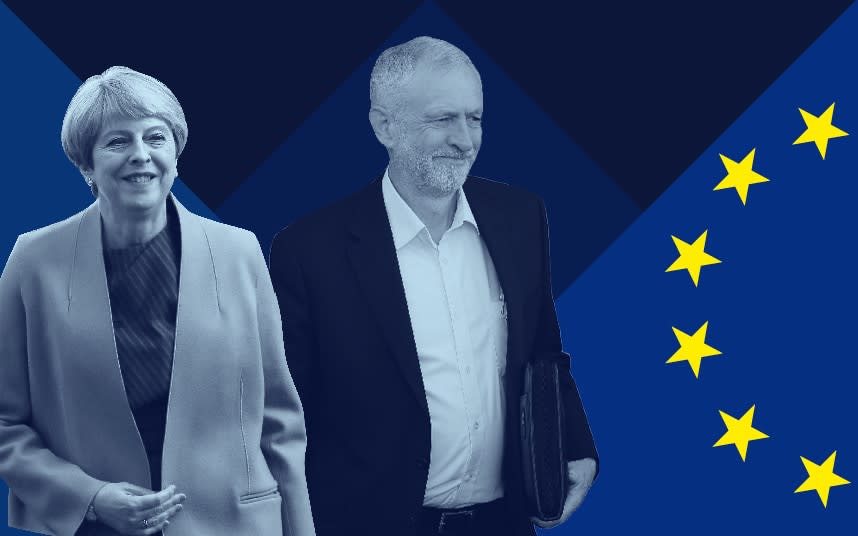
The prospect of a hung Parliament would throw serious doubt over Brexit negotiations, due to begin in earnest in just 10 days.
The BBC/Sky/ITV poll put the Conservatives on 314 seats, Labour on 266, the Scottish National Party on 34, Liberal Democrats on 14, Plaid Cymru on three and Greens on one.
The EU's chief Brexit negotiator Michel Barnier has set June 19 as his favoured date for the start of talks, due to last around 14-18 months.
But Brussels officials have indicated that the date is not set in stone, meaning it could be delayed to take account of any change in the UK Government.
What cannot easily be delayed, however, is the date of Britain's departure from the EU, which is due to take place exactly two years after the triggering of the Article 50 Brexit process on March 29 2019, whether or not a withdrawal deal has been reached.
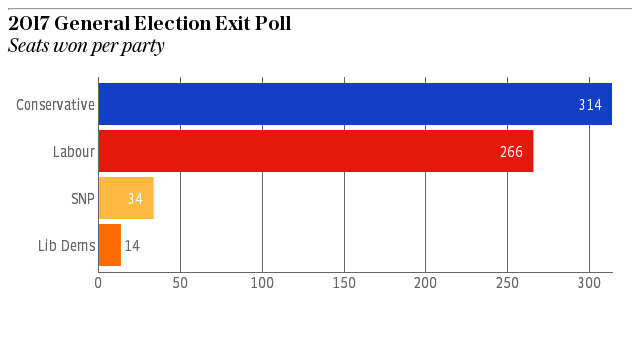
Protracted negotiations over the formation of a new government - or even a second general election in 2017 - could put back the start of formal talks, squeezing even further the limited time available to forge a complex withdrawal agreement and a separate deal on future trade arrangements.
The PM may have to quit
Theresa May repeatedly urged voters to hand her a large majority so that she could go into talks in Brussels with the firm backing of the country and the House of Commons behind her.
She warned that if she lost just six seats, she would no longer be Prime Minister, and an unprepared Jeremy Corbyn would go "naked and alone" to the negotiating table.
Under the terms of Article 50 of the EU treaties, the two-year deadline for the UK to leave the union can be extended only with the agreement of the other 27 member states.
It is unclear whether the letter informing the European Council of Britain's intention to quit can be revoked.
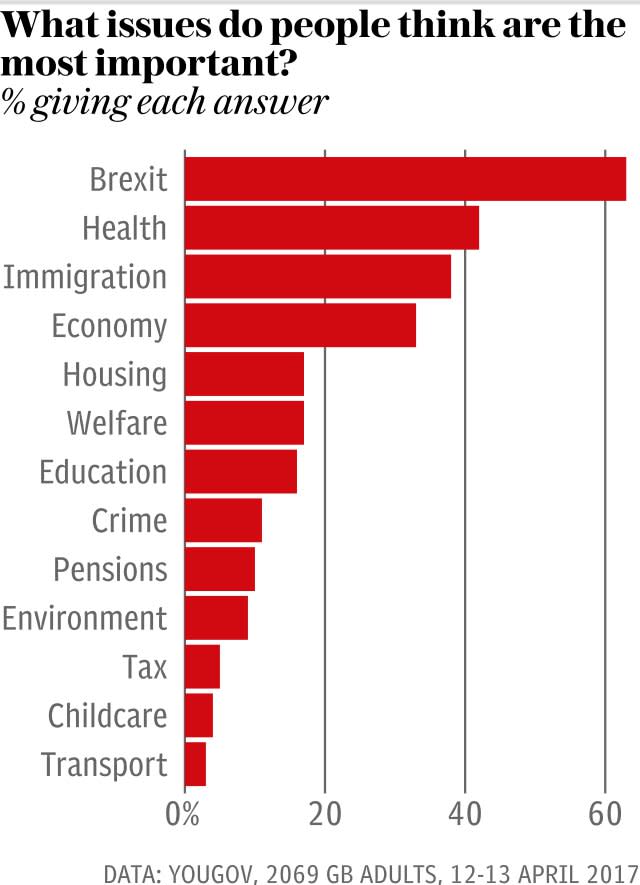
European Council president Donald Tusk has said he believes Article 50 can be reversed, but Government ministers insist there is "no turning back".
How has Brexit affected the 2017 General Election?
It has only been two years since David Cameron won an unexpected majority at the 2015 general election, but the UK's political landscape has changed dramatically in that time.
Last year's EU referendum split the country down the middle and the Remain vs Leave rivalry has not gone away in the intervening 10 months.
Brexit is dominating the national conversation with the issue taking up a huge amount of the government's energy, even before the negotiating process has officially commenced.
A recent poll by YouGov showed that 63 per cent of Britons think that Brexit is one of the three most important issues the UK faces in the coming months. This makes it by far the most popular choice, with health coming second on 42 per cent.
The Conservatives have the Brexit factor
The issues surrounding Brexit seemed sure to influence the way that people voted today and constituencies could well change hands depending on how much each party is trusted to negotiate the UK's exit from the EU.
This plays into the hands of Theresa May with the same YouGov poll suggested that nearly four times as many people think the Conservatives are the best party to handle Brexit compared to Labour.
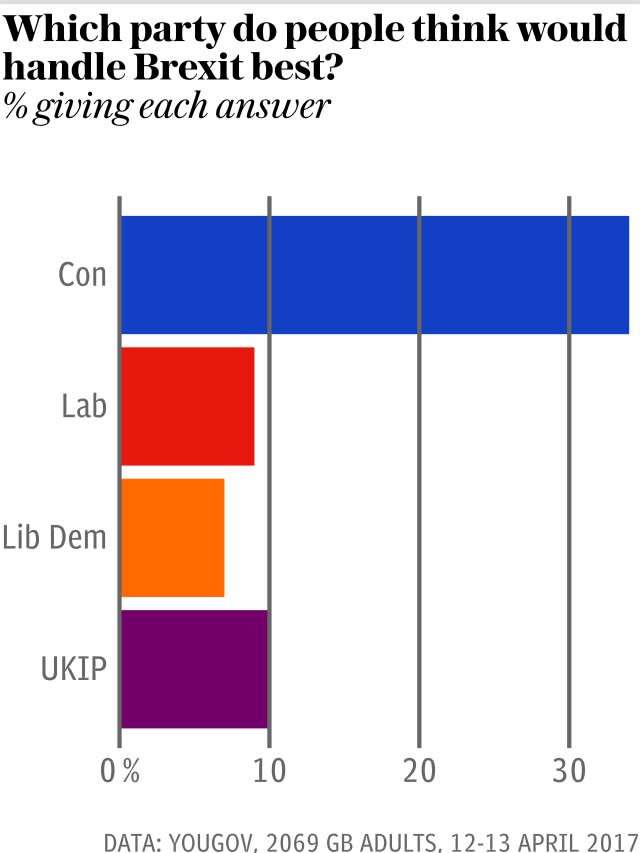
Thirty-four per cent of respondents picked the Conservatives as the best party in this regard compared to the nine per cent who picked Labour and the seven per cent who picked the Lib Dems. Both of these parties are out-polled by UKIP who are sitting on 10 per cent.
The Conservatives' dominance when it comes to being trusted to deliver Brexit must have been a factor in the reasons why Theresa May chose to call an early general election at this time.
Her hard Brexit stance could alienate some Conservative voters in places like Devon and Cornwall, but the perceived lack of a strong alternative option may mean that this will not matter.
Labour have big problems when it comes to Brexit
The Conservative party's position of strength over Brexit looks rosier due to Labour's relative weakness on the issue.
Labour's message on Brexit under Jeremy Corbyn has been mixed, with the Labour leader reluctantly campaigning to Remain before demanding that Article 50 should be invoked the morning after the referendum.
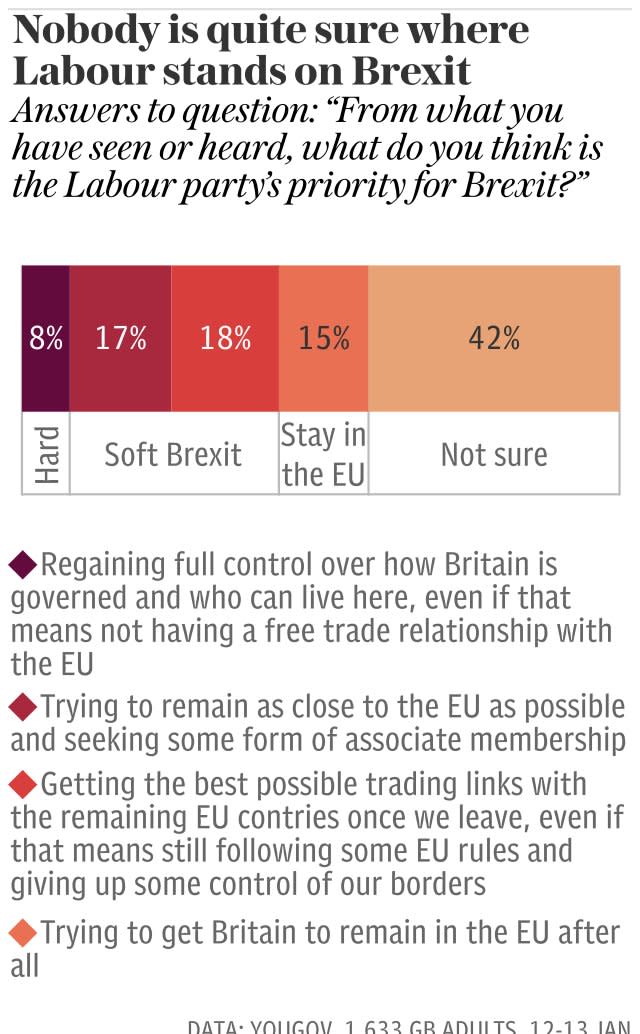
Corbyn also refused to let Labour MPs vote against the government's bill to trigger Article 50, something that led several front-benchers to rebel against the Whip.
In this instance you can forgive Corbyn his mixed messages. While a majority of Labour voters voted to Remain in the EU in last June's referendum, a majority of Labour-voting constituencies voted to Leave the EU.
On top of this, a demographic analysis of the EU referendum results by politcal scientist Chris Hanretty suggests that -were the voting to have taken place in parliamentary constituencies as opposed to local authorities - there would be 150 more Leave constituencies than Remain ones.
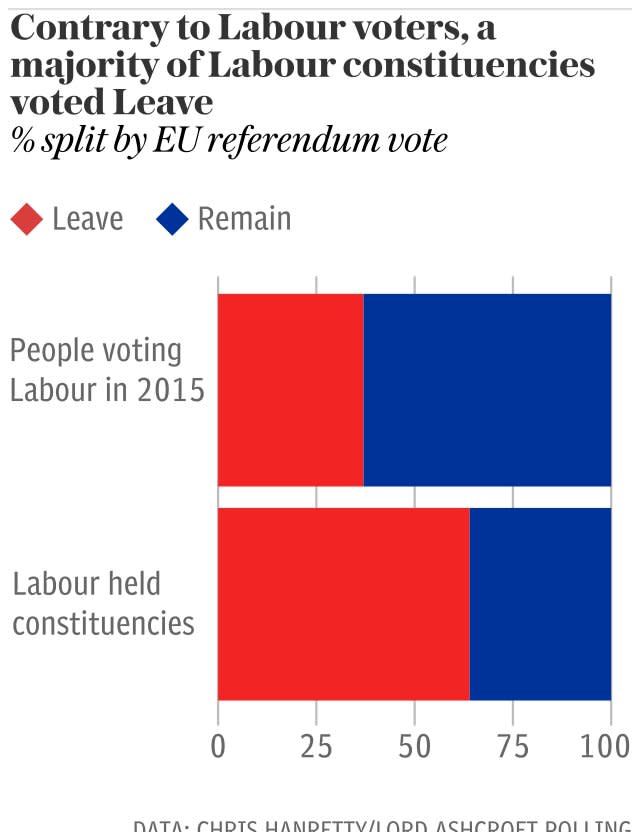
This will have been a driving factor behind why the Labour leadership took a hard line on refusing to oppose the Conservative's desire to trigger Article 50.
It would be very difficult to win a general election on a ticket that vowed to - or was seen to - oppose or somehow frustrate Brexit.
Labour voters are split on what kind of Brexit they want, and this makes it nigh on impossible for Corbyn's team to come up with an approach that will please everybody.
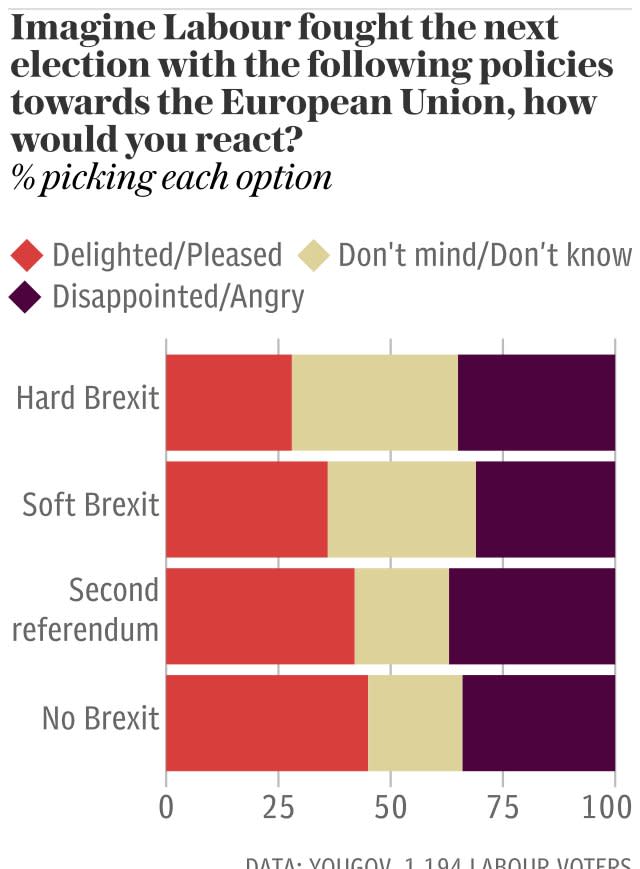
Will the Lib Dems rise again as the voice of the Remainers?
The Liberal Democrats were viewing this snap election as an opportunity to regain some of the ground that they lost in the 2015 general election.
In the wake of the referendum, Tim Farron's party sought to establish themselves as the voice of the 48 per cent who voted to Remain.
This is a vacuum that no other major party has tried to fill and their desire to see a second referendum on the terms of Brexit is likely to attract votes.
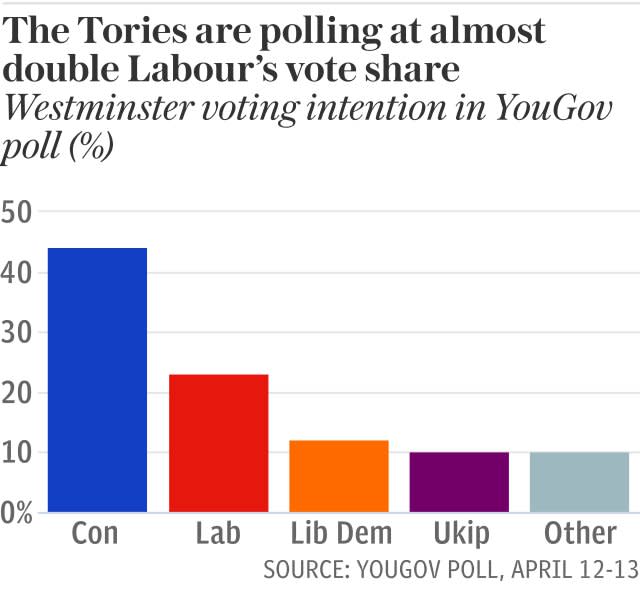
After successfully winning the Richmond Park by-election by defeating Zac Goldsmith at the end of last year they are currently polling at 12 per cent.
This would constitute a big improvement on the 7.9 per cent vote share they received in 2015. Unlike Labour they have the luxury of not having to win the general election in order for their campaign to be deemed a success.
Which MPs could be under threat because of their voting history?
When it comes to individual MPs whose jobs are threatened by their Brexit stance contradicting that of their constituents, several MPs will be nervously eyeing the polls.
There are two Labour MPs - Paul Farrelly and Angela Smith - that voted against triggering Article 50 whose constituents voted for Brexit with a greater margin than their own 2015 majority.
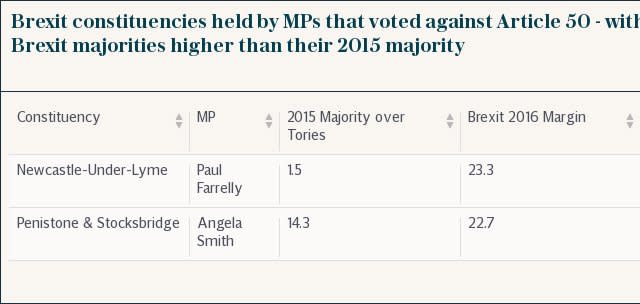
MPs such as Thangam Debbonaire (Lab) Jo Stevens (Lab) Tania Mathias (Con) Nicola Blackwood (Con) Mary Robinson (Con) represent Remain constituencies and yet voted for Article 50.
The Lib Dems came in second place in each of these constituencies in 2015, and with Remain majorities larger than their MPs' majorities in 2015, they could be under threat from a Lib Dem resurgence based on their support from Remainers.
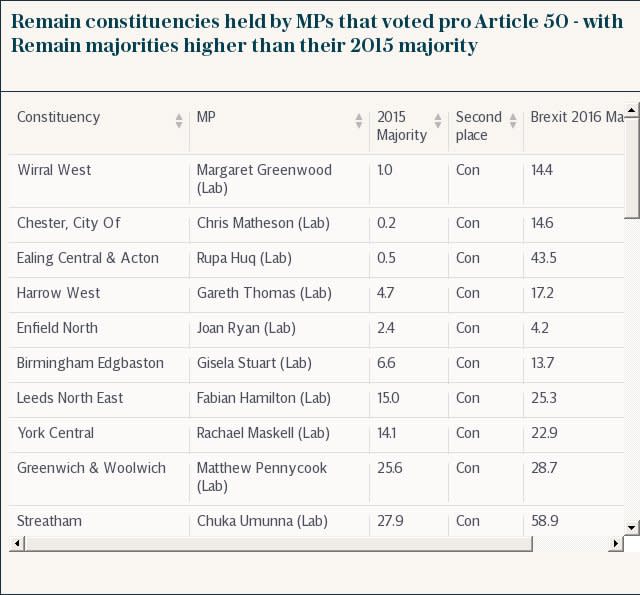
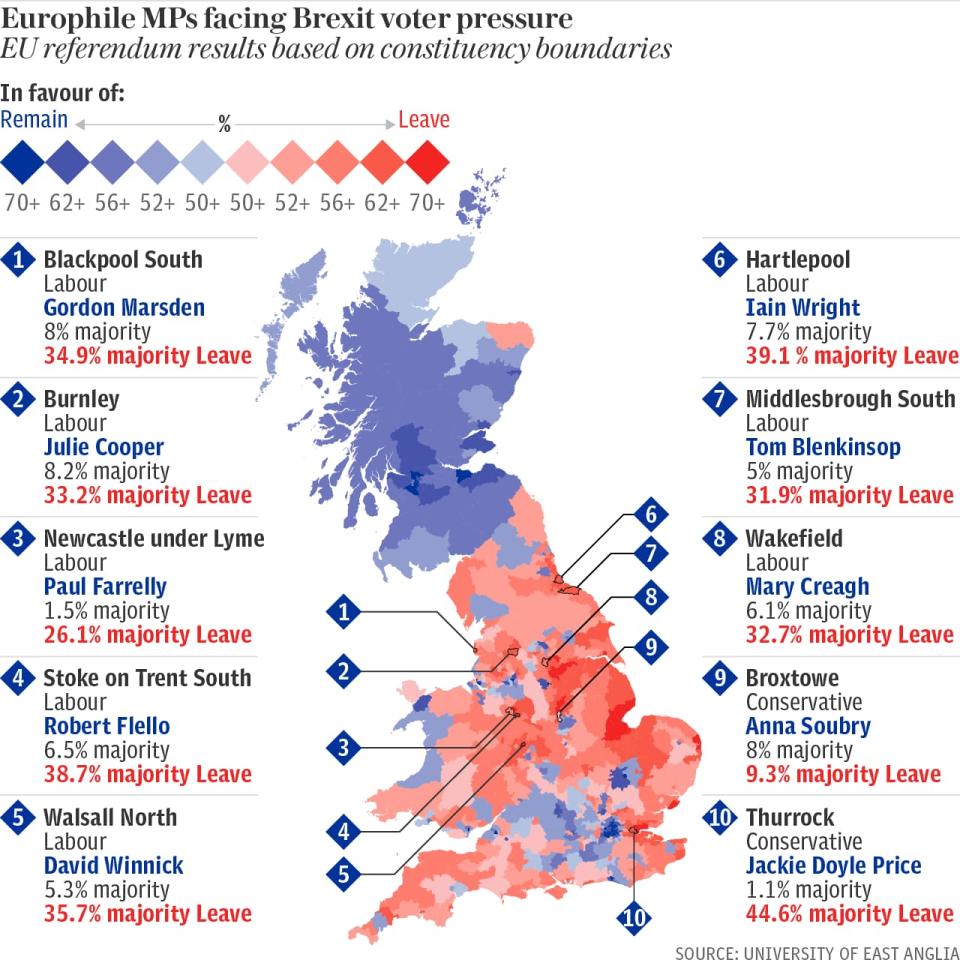

Our manifesto: Real political insight, free for 30 days.
Rely on unrivalled insight and sharp analysis from our stellar team of Westminster insiders.
Join the most trusted voice in politics. Follow Election 2017 with Telegraph Premium.
Start your no obligation, 30 day free trial today.

 Yahoo News
Yahoo News 
